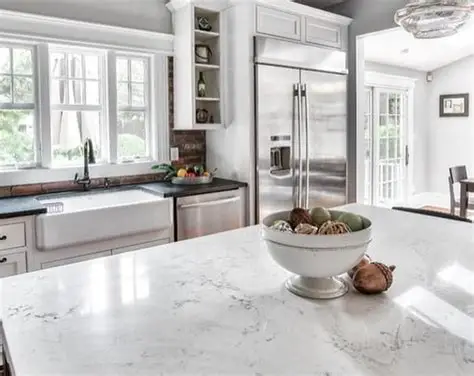Quartz countertops are a premium choice for homeowners looking for durability, elegance, and low maintenance. Their non-porous structure and stunning variety—from white quartz countertops to Calacatta quartz countertops—make them a favorite in both modern kitchens and bathroom vanities. But as tough as quartz is, using the wrong products or cleaning methods can still damage the surface.
In this guide, you’ll discover what not to use on quartz countertops, why these materials can cause harm, and the best practices to keep your engineered stone countertops looking pristine for years to come.

What Are Quartz Countertops?
Quartz countertops are engineered stone countertops made by combining natural quartz crystals with polymer resins and pigments. This creates a non-porous, highly durable surface that resists staining, moisture, and bacteria.
These countertops are available in a wide array of designs including:
- Marble look quartz countertops
- Veined quartz countertops
- Black and grey quartz countertops
- Affordable white quartz countertops for modern kitchens
👉 Learn more: What Are Quartz Countertops?

Why Quartz Countertops Are Durable—But Not Invincible
While quartz is incredibly strong and doesn’t require sealing like granite or marble, its surface can still be:
- Etched or dulled by harsh chemicals
- Damaged by extreme heat
- Scratched by abrasive tools
Proper care is essential to protect your investment and preserve the aesthetic of your quartz kitchen countertops or bathroom surfaces.
What Not to Use on Quartz Countertops
1. Bleach
Bleach is a strong chemical that can break down the resin binders used in quartz countertops. It may cause:
- Discoloration
- Dulling of the surface
- Resin degradation over time
Use a mild dish soap and warm water for daily cleaning instead.
2. Vinegar and Citrus-Based Cleaners (for daily use)
While vinegar can help remove hard water stains when used sparingly, regular use can erode the finish of quartz countertops due to its acidic nature.
📌 Safe for occasional use only:
👉 How to Remove Water Stains from Quartz Countertops
👉 Hard Water Stains on Quartz Countertops?
3. Ammonia
Ammonia-based cleaners are too harsh for quartz and may leave behind a cloudy or streaky finish. They can also wear down the protective layer of resin on the surface.
4. Oven Cleaners and Heavy-Duty Degreasers
These are among the most damaging products. They often contain strong solvents that can:
- Strip the finish
- Leave permanent damage
- Void the manufacturer warranty
Avoid using them near or on any quartz slabs for countertops.
5. Scouring Pads and Abrasive Sponges
While quartz resists scratches better than many materials, abrasive pads (like steel wool or harsh scrubbers) can cause micro-scratches that dull the shine—especially noticeable on white or black quartz countertops.
Use only non-abrasive sponges or soft microfiber cloths.
6. Magic Erasers (Used Aggressively)
Though effective for removing stubborn stains, overuse or aggressive rubbing with a Magic Eraser can wear away the surface’s polished finish, especially on high-gloss Calacatta quartz countertops or marble-look designs.
7. High-Heat Appliances or Hot Pans
Quartz is heat-resistant, not heat-proof. Placing hot pots, pans, or appliances like slow cookers directly on the surface can cause thermal shock, leading to:
- Burn marks
- Cracking
- Resin damage
Always use trivets or heat pads.
8. Permanent Markers or Ink
Pigmented markers can penetrate the surface if left too long, especially on light-colored quartz countertops. Clean immediately using a safe stain remover or rubbing alcohol for tough spots.
9. Nail Polish Removers with Acetone
Acetone can erode the resin in quartz surfaces and cause fading or etching. Keep all acetone-based products away from bathroom quartz countertops where cosmetics are used.
Best Practices for Quartz Countertop Care
Daily Cleaning Routine
- Use: Warm water + mild dish soap
- Tools: Soft cloth or non-abrasive sponge
- Dry: Wipe dry to avoid water spots
Stain Removal Tips
- Oil-based stains: Use a degreaser safe for quartz
- Pigment stains (coffee, wine, ink): Try a baking soda paste or 70% isopropyl alcohol
- Mineral deposits: Use diluted vinegar sparingly
👉 Need help with stains?
How to Remove Water Stains from Quartz Countertops
How to Remove Stains from White Quartz Countertops
Quartz vs Granite: Which Is Easier to Maintain?
| Feature | Quartz | Granite |
|---|---|---|
| Sealing Required | ❌ No | ✅ Yes |
| Stain Resistance | High | Moderate |
| Heat Resistance | Moderate | High |
| Scratch Resistance | High | High |
| Cleaner Compatibility | Mild cleaners only | More flexible options |
👉 For granite maintenance:
What Is the Best Cleaner for Granite Countertops?
How to Buff and Polish Granite Countertops?
Are Quartz Countertops Worth It?
Absolutely. If you want a surface that’s easy to maintain, stain-resistant, and available in numerous designs—from budget quartz countertops to luxury Calacatta slabs—then quartz is a top choice.
It’s also perfect for:
- Low maintenance quartz countertops for busy families
- Best quartz countertops for kitchens and bathrooms
- Custom quartz countertop installers seeking versatile materials
Quartz Countertop Installation Cost
| Quality Level | Average Cost (Installed per sq. ft.) |
|---|---|
| Budget quartz countertops | $50–$70 |
| Mid-range quartz | $70–$100 |
| High-end (e.g., Calacatta quartz) | $100–$150+ |
Where to Buy Quartz Countertops
Explore options at:
- Quartz countertop showrooms
- Local quartz countertop suppliers
- Online retailers offering delivery and samples
Need help with setup? Hire custom quartz countertop installers or explore DIY quartz countertop installation tips if you’re handy.
Search:
- Quartz countertops near me
- Quartz countertops in [city/region]
Final Thoughts
Quartz is one of the most durable and stylish materials you can install—but only when properly cared for. By knowing what not to use on quartz countertops, you can maintain their shine, color, and structure for decades.
Avoid harsh chemicals, abrasive pads, and high heat. Stick to quartz-safe cleaners, wipe spills promptly, and show your countertops the care they deserve.
With just a little maintenance, your quartz countertops will stay stunning for years to come.

